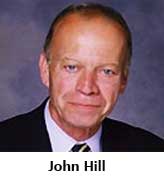 |
June 19, 2015 - Supply Chain Flagship Newsletter |
 |
| FEATURED SPONSOR: RESILINC |
||
 |
||
Download the Ultimate Guide to Supply Chain Resiliency Program Success! |
 |
|
||||||||||||||||||||||||||||||||||||||||||||||||||||||||||||||||||||||||||||||||||||||||||||||||
So I thought it might be fun to do it again here in 2015, and both Hill and I enjoyed the effort. For those that don't know, Hill is currently a consultant at St Onge, and has had a great career, perhaps most notably as CEO of a company called Logisticon, which was one of the earliest WMS companies and which ultimately produced many people who played prominent roles in WMS after Logisticon closed under some very unusual conditions (more on that someday) that had nothing to do with Hill. There is quite a bit more, but hopefully that gives enough of a flavor. So here today are some highlights of our recent interview, this time a much longer one than in 2003. You will find the full transcript in next week's OnTarget newsletter.
He believes WMS vendors need to up their games in terms of who they hire and how they train them for these deployments. "You need people who understand distribution, not just how to configure the WMS product. And that includes the front end, the sales force, who I think need to have stronger knowledge of both distribution and the product they are selling." He added. "I've received some sale pitches over the past few years where you wonder if they've ever even walked a warehouse." But WMS customers often don't help themselves either, Hill believes. "In my experience, supply chain projects failed when users didn't fully do their homework, or skipped important steps in the process, whether its failing to well define workflows and processes, performance goals, all the needed capabilities, etc.," he says. "But even when they've done all that, some companies still don't well connect all those requirement to what's in the different WMS packages they are evaluating. It's hard work, but it has to be done correctly, and if it's not it can lead to the kind of deployment pain you referenced." In October 2003, RFID was ready take off, with the EPCglobal organization just forming, the Walmart tagging mandate announcement, and RFID climbing to almost mania conditions. We discussed that back in that first interview. Then, the Walmart program imploded just a few years later, and the momentum for RFID in distribution collapsed with it, especially in the US. What happened, and will that change someday soon? "The Walmart announcement was a watershed event, and cost a number of companies a lot of money in terms of preparing for those mandates," Hill said. "What we wound up with unfortunately were cost and performance issues that I might compare to "square peg-round hole." The technology was not ready at a price point that could be cost justified for the applications Walmart was trying to pursue," leading to the program's demise. But the Walmart mandate did lead to huge investments in RFID technology, even though many venture capital firms lost their shirts in the end, and the technology today is far superior to what it would have been otherwise, Hill said. While he believes RFID likely will be used more extensively in distribution than is the case today, it will be used in combination with other related technologies, including bar coding, Voice, smart glasses and more, rarely as the only such technology in a DC. Next, he said, the program would automatically generate and configure a WMS to execute that plan and manage performance. It would do the same as activity profiles and business conditions changed over time - a sort of "magic WMS" you might call it. Good guy. Good stuff. Full transcript with much more next week in OnTarget. Any reaction to John Hill's comments? Do you know John? Let us know your thoughts at the Feedback button or section below. |
|||||||||||||||||||||||||||||||||||||||||||||||||||||||||||||||||||||||||||||||||||||||||||||||||
|
|||||||||||||||||||||||||||||||||||||||||||||||||||||||||||||||||||||||||||||||||||||||||||||||||
|
|||||||||||||||||||||||||||||||||||||||||||||||||||||||||||||||||||||||||||||||||||||||||||||||||
|
|
|
YOUR FEEDBACK
We received some modest Feedback on our article on Kroger being the latest retailer to begin a program to hire disabled workers in a distribution center, but wondering why more retailers haven't initiated these programs after success at Walgreens and a few others. Some of the Feedback from our partners over a RetailWire.
Feedback on Disabled Worker Programs in Retail DCs:
There are more risks in the distribution center than in the stores. The key is that Kroger has been so aggressive in getting disabled workers into the stores. I shop at Frys, a Kroger arm in Arizona, and have great relations with the many disabled employees at our favorite Frys store. It's great to see and they're dedicated workers who love what they do - and we all ignore their challenges. Tom Redd |
||
The article does a good job of summing up most of the reasons but avoids the one key reason: discrimination. People feel uncomfortable around people who have disabilities. As the article says, and research has shown, employees with disabilities if hired and trained properly can be real assets. Mel Kleiman Humetrics
|
||
At the risk of stating the obvious: because distribution center (warehouse) work is physically demanding, and often dangerous, and the list of disabilities which cannot be accommodated is long (visual impairment, paralysis, neuromuscular conditions, etc.). Walgreens and Kroger are to be applauded - even if the modest claim of serving their self-interest is true - but I'd be cautious about stereotyping (even a seemingly positive one). I suspect the (perceived) greater reliability is largely due to more rigorous screening. Anonymous |
||
I believe there is just a lot of mystery here to most distribution companies and retailers. You are afraid of what you don't know. In addition, I think these initiatives are perhaps obviously best suited for DCs with a lot of piece picking, which is true in many/most retail DCs, but perhaps why the move has not spread to other sectors. But in the end, these programs seem to be having success, so more companies should be looking at them. Christian Wolfe Long Island, NY
|
SUPPLY CHAIN TRIVIA ANSWER
Q: In combination, Ford Whitman Harris and RH Wilson are responsible for inventing and popularizing what core supply chain/procurement concept?
A: Economic Order Quantity (EOQ).
| © SupplyChainDigest™ 2003-2015. All Rights Reserved. SupplyChainDigest PO Box 714 Springboro, Ohio 45066 |
POWERED BY: XDIMENSION
|









